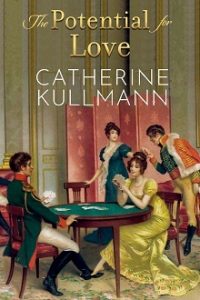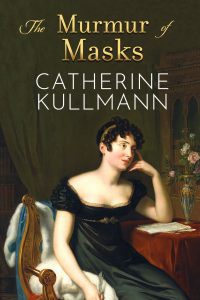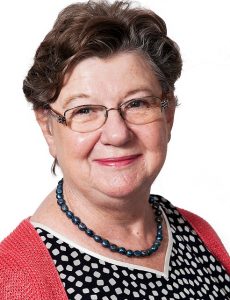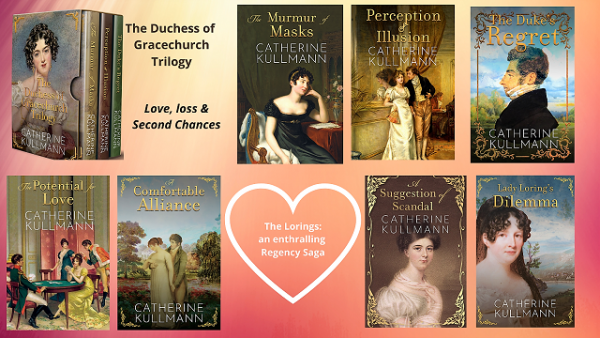Writing About Love
By Catherine Kullman
Barbara Bos has suggested that I talk about ‘writing about love in your novels, what makes a good story in that respect?’
Love stories have been popular since people began telling stories and yet so many authors shy away from including a romantic arc in their novels. Why is this? In Have His Carcase, Dorothy L Sayers has her fictional author Harriet Vane refuse her publisher’s demand to add a love-interest to her newest detective novel. This, as the reader knows, is because Harriet is torn between her attraction to the wealthy Lord Peter Wimsey and her profound feeling that a marriage between them could not work. Their courtship, one of the great romantic stories in fiction, spans several of Sayers’ novels and, at this stage, Harriet cannot bear to think about love. But Sayers has revealed one of the secrets of writing about love—we cannot do it without bringing something of ourselves into it.
 For this article, I am concentrating on romantic love, the search for one’s life partner, that person without whom we cannot imagine spending the rest of our lives. But we love others, too, and these relationships can be just as fraught. Love for parents, siblings, children, friends, unwanted love and unrequited love, shattered love, love painfully achieved, love lost—none of us can go through life without encountering it in all its guises, even if we do not always recognise it. To write about it, we must be prepared first to be honest with ourselves, to recognise the emotions it engenders. It is only then that the writer’s alchemy can get to work, imagining, creating, transmuting our characters’ stories, bringing them to life for the reader.
For this article, I am concentrating on romantic love, the search for one’s life partner, that person without whom we cannot imagine spending the rest of our lives. But we love others, too, and these relationships can be just as fraught. Love for parents, siblings, children, friends, unwanted love and unrequited love, shattered love, love painfully achieved, love lost—none of us can go through life without encountering it in all its guises, even if we do not always recognise it. To write about it, we must be prepared first to be honest with ourselves, to recognise the emotions it engenders. It is only then that the writer’s alchemy can get to work, imagining, creating, transmuting our characters’ stories, bringing them to life for the reader.
While we do not have to have personally experienced every story arc we write; we must strive to identify, understand and convey our characters’ underlying emotions at each stage. Only then can the reader share the thrill and uncertainty of falling in love, the ecstasy of mutual love acknowledged and fulfilled, the enduring commitment of a long and loving relationship or even the heartbreak of true love lost.
Let us look at the narrative arc of a love story. To start, a quotation from my novel The Potential for Love, set in 1816. Lord Malvin, father of the heroine, Arabella, speaks.
“Why do we decide for one person and not another? Let us assume we have free choice—that we are not forced to marry for any reason other than the natural desire to be one with the person we choose as our life’s companion, the other parent of our children.”
“Yes.”
“I think that person will be similar to us in many ways—birth and upbringing, for example, general outlook on life, their sense of the ridiculous—but they must also be different so that they complement us, so that we can learn from them and they from us. That is very important. But apart from that, there is an essential something that calls us to them, something that we recognise or that resounds within us on the most intimate level.”
“Love, you mean?”
“Rather the possibility or potential for love.” He shook his head. “It’s impossible to describe, Arabella, and it may take us some time to recognise it, but we do know when it is not there.”
At the start of a love story, we must have that initial spark. It can be a moment of recognition, an initial attraction, even an unusually strong dislike where they strike sparks off one another. Other stages can include:
- Getting to know one another
- 1st Pivotal moment
- How has their interaction changed?
- 2nd Pivotal moment—it’s getting serious
- 1st Climax—declaration and response
- Happiness
- Discord
- 2nd Climax—Reconciliation
- Happy end
- Epilogue
Conflict can be added by external events, by discord and disagreement. Many love stories follow the traditional three act arc of Boy Meets Girl, Boy Loses Girl, Boy Gets Girl Again. The problem with this, to my mind, is Act Two. There is, of course, the Big Drama—a mad wife in the attic, discovered on the day of what would have been a bigamous wedding. You have to be a very skilled writer to pull this off. What about an ethical dilemma—his previous girlfriend is pregnant. Does he return to her? Or one person is arrested, convicted and imprisoned. Does the other stand by them? Or enforced separation, for example during war. Will they remain faithful while apart? There is lots to explore and the possibilities are endless, but readers are no longer willing to accept the convenient Big Misunderstanding that would easily be resolved if only the two idiots would talk to each other.
In The Potential for Love, Thomas and Arabella did talk to one another and found a way out of their difficulties. I wondered if this would be too tame for the readers, and so was particularly pleased by this review. “In this book the misunderstanding is both realistic in and of itself and the two characters reaction to it is also very realistic. This misunderstanding and the handling of it are probably the best I’ve ever read in terms of being able to relate to the characters and why each of them felt the way that they did, reacted the way that they did, and resolved it the way that they did.”
If your novels are set, as mine are, in a different era, the interaction of your characters is restricted by the mores of that time. Consider Elizabeth Bennet and Mr Darcy. How much time have they actually spent alone before they agree to get married? Today, we would consider them very rash to rush into a lifelong commitment on such a short acquaintance. But they could not then, as today’s couples can, first date, then agree to an exclusive relationship, even live together before they marry. They could only get to know one another after their marriage. This is why in several of my books the couple marries quite early on, and the development of the relationship only comes afterward. The real happy end is when they are able to make a soul-deep commitment to one another.
 Emotions are the heart of a love story. I like to write with changing points of view (POVs) so that the reader is privy to the thoughts and emotions of both characters. Yes, words and actions give some indication of what a person is feeling, but, depending on the circumstances, they can be very misleading. For example, in my novel The Murmur of Masks, Luke falls in love with Olivia at first sight, but she is married to someone else. He cannot rid himself of his fascination with her and so, when they meet, he makes a point of provoking her into rebuking him for his flippancy. He will have this interaction at least but she does not know the reason for his behaviour.
Emotions are the heart of a love story. I like to write with changing points of view (POVs) so that the reader is privy to the thoughts and emotions of both characters. Yes, words and actions give some indication of what a person is feeling, but, depending on the circumstances, they can be very misleading. For example, in my novel The Murmur of Masks, Luke falls in love with Olivia at first sight, but she is married to someone else. He cannot rid himself of his fascination with her and so, when they meet, he makes a point of provoking her into rebuking him for his flippancy. He will have this interaction at least but she does not know the reason for his behaviour.
The reader can also eavesdrop on internal monologues where a character tries to disentangle the awkward emotions that go with falling in love; infatuation, exaltation, doubt, jealousy, suspicion, pride, fear of rejection, feeling unworthy, frustration, anticipation, resolve.
When writing a love story, dialogue is all important. Through dialogue, the characters get to know each other and also begin to explore their own feelings. As a writer, I take a back seat here. I create the situation and then let them get on with it. It’s as if I ‘hear’ one speak and the other reply. Frequently I am surprised where such a conversation takes them, and me. Usually, one person takes the lead and I describe the scene from the other’s POV—what do they feel, how do they react, what do they observe in the other? After a tense discussion, you can go deeper into each person’s reactions by having them reflect on what has just happened.
Don’t be afraid of embellishing your dialogue when the situation calls for it. When Olivia finally accepts Luke’s suit in The Murmur of Masks, she repeats what he said to her some days earlier when he proposed.
“I love you, Luke. I want to marry you and share your life; I want to fall asleep in your arms, your head on my breast and I want to turn to you in the night, for comfort or love.”
“Olivia!” The bubble burst flooding him with joy. Unable to remain seated, he went to kneel beside her.
A tender light filled her golden eyes as she continued, “I want to live with you, be a true wife to you and the mother of your children. I want you to be a good father to all my children. I want to be by your side, and have you by mine for all our joys and sorrows.”
He kissed her hands reverently, transported by this repetition of his avowal to her in the turret room.
Blushing deliciously, she continued almost in a whisper, “I want to love you in every way a woman can love a man and you to love me in every way a man can love a woman.”
And this leads us to the final topic in our discussion of writing about love. The bedroom door—open or closed? The extent to which I open the bedroom door depends on the storyline. A couple’s sex life reflects the ups and downs of their life together. An old adage reminds us that ‘there is more to marriage than four bare legs in a bed’, but it is precisely the sexual element that makes marriage or a love affair different from all other relationships. To ignore physical attraction, desire, lust or sexual intimacy is to ignore the foundation of the bond between a couple.
I do not shy away from it, but also do not go into graphic physical detail. Here, as elsewhere, emotions and reactions are just as important as actions. Where you place your books is completely up to you, provided you are writing for adults. If you are writing for teenagers or young adults, you will need to be more careful. You will find a useful classification of ‘Heat Levels’ in fiction here. https://i.redd.it/rm8rmvze2cl81.jpg . There are readerships for all levels. My books are between 1 and 2½ in this classification
I hope you have found these reflections on writing about love useful. No matter what your genre, a love-interest adds an additional dimension to your story.
—
About Catherine Kullmann
 Catherine Kullmann was born and educated in Dublin. Following a three-year courtship conducted mostly by letter, she moved to Germany where she lived for twenty-five years before returning to Ireland. She has worked in the Irish and New Zealand public services and in the private sector. Widowed, she has three adult sons and two grandchildren.
Catherine Kullmann was born and educated in Dublin. Following a three-year courtship conducted mostly by letter, she moved to Germany where she lived for twenty-five years before returning to Ireland. She has worked in the Irish and New Zealand public services and in the private sector. Widowed, she has three adult sons and two grandchildren.
Catherine has always been interested in the extended Regency period, a time when the foundations of our modern world were laid. She loves writing and is particularly interested in what happens after the first happy end—how life goes on for the protagonists and sometimes catches up with them. Her books are set against a background of the offstage, Napoleonic wars and consider in particular the situation of women trapped in a patriarchal society.
She is the author of The Murmur of Masks, Perception & Illusion, A Suggestion of Scandal, The Duke’s Regret, The Potential for Love , A Comfortable Alliance and Lady Loring’s Dilemma
Catherine also blogs about historical facts and trivia related to this era. You can find out more about her books and read her blog (My Scrap Album) at her website You can contact her via her Facebook page or on Twitter

Category: How To and Tips

























What a fascinating essay! It’s of particular interest to me because I find writing the romantic part of my books challenging. Also, I see there are several of your novels I have not yet encountered–huzzah! More winter reading material.
I’m glad you find it useful, Kathleen. Enjoy your winter reading – and writing.
Thank you for hosting me.